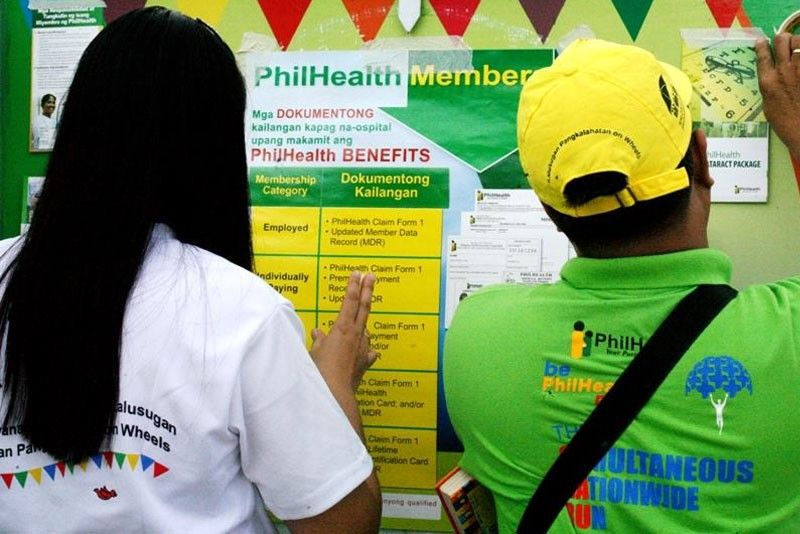PhilHealth: 2 ‘mafias’ fighting over spoils?

MANILA, Philippines — The finger-pointing among former and present officials of the Philippine Health Insurance Corp. (PhilHealth) over a multibillion-peso corruption scandal could be simply a case of two “mafias” fighting over spoils from the state insurance firm, senators said yesterday.
Senate Minority Leader Franklin Drilon and Sen. Panfilo Lacson, in separate interviews, gave their initial assessment of the hearing last week into the P153-billion estimated losses of PhilHealth allegedly due to inefficiencies, overpayments and “ghost claims,” among others.
The ongoing inquiry is being jointly held by the Senate Blue Ribbon and health committees, chaired by Senators Richard Gordon and Christopher Go, respectively.
“One way to find out if this (fighting over PhilHealth funds) is the case is the paper trail, or the movement of documents where the many anomalies happen, and where there are irregular disbursement of funds,” Lacson told dzBB.
During the hearing, former PhilHealth president Roy Ferrer and Roberto Salvador, former member of the agency’s formal economy sector, pointed to seven suspended executives and one dismissed official as allegedly part of a mafia responsible for siphoning payments from the agency in connivance with certain hospitals.
The two former officials, whom President Duterte asked to resign last June, identified the eight as Dennis Adre, PhilHealth, regional vice president for Region 12; Datu Masiding Alonto, Jr., RVP for Region 10; William Chavez, RVP for Region 7; Jelbert Galicto, RVP for Caraga; Valerie Anne Hollero, assistant corporate secretary; Khaliquzzaman Macabato, RVP for the Bangsamoro Autonomous Region in Muslim Mindanao; Miriam Grace Pamonag, former RVP of Region 12; and Paolo Johann Perez, RVP for Region 4-B.
Salvador said Pamonag is already dismissed but did not say why. The former officials said the eight, who have been at the agency for 10 to 20 years, have strongly resisted being reshuffled, and went as far as getting injunctions from the Civil Service Commission to stop their transfer to other posts.
The accused, however, strongly denied the allegations saying they are being harassed for being outspoken as a group, pointing out weaknesses and flaws in the PhilHealth system that are being exploited for corruption.
Some of the officials tagged Ferrer and Salvador as “B1” and “B2”—referring to two main banana characters in a children’s show “Bananas in Pajamas”—working in tandem to drive them out of the agency through what they called were ridiculous charges, apparently to keep the fraud-prone system at PhilHealth in place.
Drilon and Lacson agreed the administrative charges filed against the eight for prolonged and repeated suspensions were due to minor offenses, like failing to properly put in their daily time records.
“It’s difficult to connect them (alleged mafia members) to anomalies like if the case against them is an alleged timecard violation happening 10 years ago. They must come out with more credible evidence than that,” Drilon said.
Junket
Lacson said the PhilHealth board, when Ferrer was still part of it and Salvador was an official, may have a lot of explaining to do when it overturned in 2018 a resolution that was upheld by the Court of Appeals (CA) to suspend the accreditation of the Cebu-based Perpetual Succor hospital, which was collecting an average of P30 million a month in claims from the agency.
It was Chavez who recommended the three-month suspension, resulting in a possible loss of at least P90 million for the hospital, and was approved by the board. The hospital appealed the decision before the CA but the appellate court dismissed the petition.
However, the board reversed its decision following a letter of appeal from Perpetual Succor. Lacson said he will find out if the trip to Europe taken by top PhilHealth officials shortly after the reversal was connected to the case.
The senators also pushed for a special review by the Commission on Audit (COA) on PhilHealth, possibly with the help of private auditing firms.
Drilon again raised serious concerns on the agency’s ability to cover medical expenses of Filipinos in the next 10 years given how much it is bleeding due to alleged corruption.
“It involves billion pesos of public money. The government provides subsidy to PhilHealth to cover for the medical expenses of the poor and informal sector, which amounts to P257 billion next year and P319 billion by 2024 due to the implementation of the Universal Health Care Act,” he said.
For the past five years, PhilHealth registered P26 billion net operating loss and has outstanding P48 billion in unpaid claims to date, Drilon said.
PhilHealth president and chief executive officer Ricardo Morales said the agency is considering tapping an international consultancy firm to conduct a thorough audit of its funds.
Drilon, however, said the Constitution mandates the COA as the government’s auditing body. He said the agency may be able to outsource a private firm to audit their funds but COA must have the final say.
Drilon also hit PhilHealth’s poor collection efficiency, saying it will affect the agency’s actuarial life.
- Latest
- Trending





























